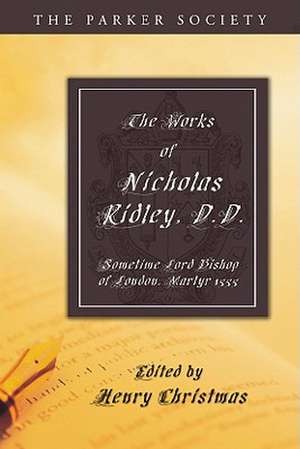The Works of Nicholas Ridley, D.D.: Parker Society
Autor Nicholas Ridley Editat de Henry Christmasen Limba Engleză Paperback
Din seria Parker Society
-
 Preț: 232.51 lei
Preț: 232.51 lei -
 Preț: 299.57 lei
Preț: 299.57 lei -
 Preț: 231.83 lei
Preț: 231.83 lei -
 Preț: 220.41 lei
Preț: 220.41 lei -
 Preț: 177.33 lei
Preț: 177.33 lei -
 Preț: 291.68 lei
Preț: 291.68 lei -
 Preț: 329.94 lei
Preț: 329.94 lei -
 Preț: 365.61 lei
Preț: 365.61 lei -
 Preț: 263.07 lei
Preț: 263.07 lei -
 Preț: 380.76 lei
Preț: 380.76 lei -
 Preț: 296.28 lei
Preț: 296.28 lei -
 Preț: 335.88 lei
Preț: 335.88 lei -
 Preț: 333.23 lei
Preț: 333.23 lei -
 Preț: 259.54 lei
Preț: 259.54 lei -
 Preț: 249.45 lei
Preț: 249.45 lei -
 Preț: 363.59 lei
Preț: 363.59 lei -
 Preț: 179.96 lei
Preț: 179.96 lei -
 Preț: 274.96 lei
Preț: 274.96 lei -
 Preț: 212.29 lei
Preț: 212.29 lei - 8%
 Preț: 396.85 lei
Preț: 396.85 lei -
 Preț: 164.99 lei
Preț: 164.99 lei -
 Preț: 298.49 lei
Preț: 298.49 lei -
 Preț: 302.21 lei
Preț: 302.21 lei -
 Preț: 309.49 lei
Preț: 309.49 lei -
 Preț: 396.84 lei
Preț: 396.84 lei
Preț: 300.26 lei
Nou
Puncte Express: 450
Preț estimativ în valută:
57.45€ • 59.87$ • 47.57£
57.45€ • 59.87$ • 47.57£
Carte tipărită la comandă
Livrare economică 03-17 aprilie
Preluare comenzi: 021 569.72.76
Specificații
ISBN-13: 9781606080603
ISBN-10: 1606080601
Pagini: 528
Dimensiuni: 137 x 211 x 30 mm
Greutate: 0.66 kg
Editura: Wipf and Stock Publishers
Seria Parker Society
ISBN-10: 1606080601
Pagini: 528
Dimensiuni: 137 x 211 x 30 mm
Greutate: 0.66 kg
Editura: Wipf and Stock Publishers
Seria Parker Society
Notă biografică
Nicholas Ridley (c.1500-1555), was an English prelate, reformer, and Protestant martyr. In 1534, while a proctor of Cambridge, he signed the decree against the Pope's supremacy in England. In 1537 he became chaplain to Thomas Cranmer, in 1540 master of Pembroke Hall, Cambridge, and in 1541 chaplain to Henry VIII and canon of Canterbury. As bishop of Rochester (1547), Ridley was chosen to strengthen and establish the Reformed teachings at Cambridge. In the reign of Edward VI, he took part in compiling (1548) the Book of Common Prayer. In 1550 he succeeded Edmund Bonner as bishop of London, where he did much to improve the condition of the poor by preaching on social injustices before the king. Ridley supported Lady Jane Grey's claims to the crown, and in 1553, shortly after Mary Tudor's accession as the Catholic Mary I, he was imprisoned. With Cranmer and Hugh Latimer he took part (1554) in the Oxford disputations against a group of Catholic theologians and would not recant his Protestant faith. He was burned at the stake with Latimer before Balliol Hall, Oxford.
